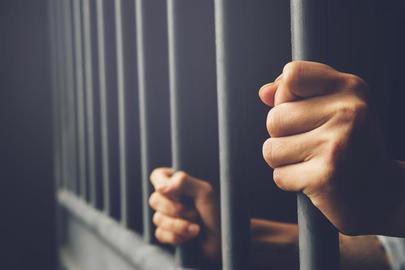The stories of many prominent Iranian political prisoners, from civil and human rights activists to lawyers and journalists, are well-known and updates on their cases regularly make the international news. But they’re not the only ones. Ordinary citizens who have also taken to the streets – or to social media – to voice dissent have also been deprived of their liberty, separated from their homes and loved ones, and locked away. Their families are often pressured not to speak to the media about their what has happened, keeping them and their fates sealed off from the outside world.
***
Morteza Parhizgar, a 26-year-old man, was released from Vakilabad prison in Mashhad on the evening of Sunday, October 10. Prior to this, he’d spent three years and nine months inside as an unreported prisoner of conscience.
Morteza was arrested back on December 30, 2017, after protests had flared up in the city of Mashhad and then spread all over Iran. The following December he was charged with “insulting the president”, “disturbing public order”, “propaganda against the regime” and “conspiracy against national security”, and sentenced to seven and a half years in prison by Branch 131 of Mashhad Criminal Court and Branch 4 of the Revolutionary Court. The sentences were eventually merged, coming to a total of 45 months.
Before he was arrested for taking part in a rally, Morteza had been a construction worker, and the sole breadwinner for his family since the death of his father. They were left to struggle alone during his years behind bars. A friend and ex-cellmate of his, Ali Gholilou, told IranWire that Morteza been offered the chance to pay a 100,000-toman-a-day bail to get out and work: an unthinkable amount of money. “It’s become more expensive, just like everything else! It used to only cost about 13,000 tomans, part of which was returned to the prisoner."
While Morteza was in prison, Gholilou said, his only sister got married. But the judiciary did not give him leave to attend her wedding. Meanwhile, his own reputation was trashed: “After his arrest, photos of Morteza and others were published in the paper. People – we don’t know exactly who – had spread the rumor that Morteza had stolen some stuff. The strain of this forced his mother to move out, and eventually someone took the house off her hands." The family, he said, now live in a smaller house and had to borrow the money to pay the deposit.
Morteza Parhizgar is one of thousands. Every year, countless ordinary citizens are detained, ill-treated, beaten, tortured and subjected to arbitrary, life-altering prison sentences for daring to envisage a different kind of Iran. Instead of applauding these people for their civic efforts, the Islamic regime criminalizes them.
Why do Prisoners Remain Anonymous?
"Citizens' rights are often violated by the judiciary from the moment of arrest,” human rights lawyer Saeed Dehghan told IranWire. “From the moment of the telephone summons, which is a kind of threat, to the interrogation, up to the final stages of a review by the Supreme Court. That means judicial officials must pressure the prisoner and his or her family not to make the matter public – so that the oppression they’ve inflicted won’t be exposed.
"In the case of political and ideological prisoners, instead of their being the purview of judicial authorities as is the law, the judiciary follows the instructions and demands of intelligence officials. Blank declarations are often issued to the officers, who then simply fill in the name. This is a clear violation of citizens’ rights, about which many ordinary citizens are unaware.
"If the judiciary wanted to treat prisoners fairly, it would allow them access to lawyers, the media and the press, so that anyone who get caught up in the legal system because of their beliefs can inform the rest of society. In the absence of an independent, transparent judiciary, we face an untold number of political prisoners."
Dehghan, who has represented many unreported prisoners of conscience, emphasized that these “anonymous” inmates are often worse-treated than better-known political prisoners. Their families are also more likely to be pressured into keeping silent, because no media outlets or international bodies are there to look out for them. “The interrogators instil the false belief in families that remaining silent is in their best interest,” he said. “It’s not always recommended to go public, but certainly silence and anonymity is what the interrogators want. Breaking the silence helps an oppressed person cease to be helpless.”
Hossein Raisi is another Iranian-born human rights lawyer who has supported many unreported political detainees down the years. One of his former clients, he said, was detained after the 2009 Green Movement protests, and had a physical disability. “Because no-one knew who he was, he was kept in solitary confinement and not allowed out to go to the bathroom for a month. He explained to me that he was avoiding drinking water so he didn’t need to go. He wasn’t a well-known figure, so no-one found out about him.”
"Most ‘non-famous’ political defendants, after undergoing harsh interrogation and sometimes torture, usually give themselves up to a lawyer the regime selects for them. Then they face long prison terms, and a great deal more pressure. In most cases, if convicted, they silently endure their sentence and have no relation with the outside world."
Related coverage:
Amnesty: Scores of Iranian Prison Deaths ‘Uninvestigated and Unpunished’
Drugs Fed to Jailed Protesters to Control Them
Open Letter from Political Prisoners: The Government is Afraid of Us
Iranians Targeted for Helping the Families of Political Prisoners
Four Decades of Prison, Torture and Executions: 100 Stories, the Same Storyline
visit the accountability section
In this section of Iran Wire, you can contact the officials and launch your campaign for various problems

























comments